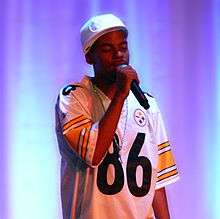Jero
| Jero | |
|---|---|
 Jero Performing | |
| Background information | |
| Birth name | Jerome Charles White, Jr. |
| Born | September 4, 1981 |
| Origin | Pittsburgh, Pennsylvania, United States |
| Genres | Enka |
| Occupation(s) | Singer, computer engineer |
| Years active | 2007-Present |
| Labels | Victor Entertainment |
| Website | http://www.jvcmusic.co.jp/jero/ |
Jerome Charles White, Jr.[1] (born September 4, 1981), better known by his stage name Jero (ジェロ), is an American enka singer[2] of African-American and Japanese descent. He is the first black enka singer in Japanese music history.
Biography
Jero began singing Enka actively at the age of six and continued to study the Japanese language all throughout high school and college.[3] He also studied Japanese for some time at the Kansai Gaidai University school of foreign languages.[4] Jero majored in information science at University of Pittsburgh and graduated in 2003, and moved to Japan in the same year. Two months after arriving in Japan, he entered the NHK Nodo Jiman competition broadcast on TV.
Jero first began pursuing his dream to become an Enka artist because of the influence of his Japanese grandmother Takiko, who had met his grandfather, an African-American serviceman, at a dance during World War II.[5] They married, had a daughter, Harumi - now a department store sales clerk - and eventually moved to his grandfather's hometown, Pittsburgh. His parents divorced when he was young, and he was reared amid a strong sense of Japanese culture.[6]
His grandmother, originally from Yokohama, Japan, first introduced Jero to Enka and it was under her guidance that he grew to love the genre as a child.[7] Jero, who majored in information technology at the University of Pittsburgh, did not initially imagine himself in a career as an Enka singer.[8] Rather, after he permanently moved to Japan, his main forms of employment were as an English teacher at NOVA and as a computer engineer.[8] He only began to actively work towards becoming an Enka singer because he had promised his grandmother that one day he would someday perform at the annual Kohaku Uta Gassen song show.[4] As a result, he actively participated in numerous singing contests while he continued to work as a computer engineer and eventually achieved real success after only two months since he had arrived in Japan.[9] His grandmother never was able to see her grandson achieve Enka fame, she died in 2005, three years before he became famous.[10]
His first single, Umiyuki (海雪, , literally, Ocean Snow), was released in Japan on February 20, 2008. It entered the Oricon charts at number 4.[11] Umi Yuki, references the Sea of Japan, but Jero has admitted that the only ocean he has ever really seen was in California.[12]
From May 21, 2008, Jero appeared in a Japanese TV commercial for Kirin "Fire" coffee, the first time he had appeared in a TV commercial.[13][14] In October 2008, he was interviewed on CNN International's TalkAsia.[15]
He won Best New Artist Award in 50th Japan Record Awards on December 30, 2008.[16]
Jero was selected to appear on the 59th NHK Kōhaku Uta Gassen, NHK New Year's Eve musical spectacular, on December 31, 2008.[17] In his participation, he fulfilled a pledge he made to his dying grandmother to appear on the yearly competition.[18] Jero appeared wearing a black and white shirt bearing the image of his grandmother.[19] He also appeared on the following year's show.
Jero made his first major U.S. appearance on March 28, 2009 during the opening ceremony of the National Cherry Blossom Festival in Washington, D.C.[5][6] Jero's first official U.S. appearance was a live concert to over 500 fans at the University of Pittsburgh, his alma mater, on August 27, 2008.[20][21]
Jero completed his first official US concert tour by singing to a sold-out house at the Palace of Fine Arts in San Francisco on March 28, 2010,[22] and at the Aratani Japan America Theatre in Los Angeles on March 31, 2010.[23] In addition, he also appeared in the 30th Anniversary Gala Celebration of the Japanese American Cultural and Community Center in Los Angeles on March 30, 2010.[24]
Appeal
African-American culture has been popular among a segment of young Japanese since the mid-1990s, so many are hoping that he will be able to spark interest in enka in the younger generation.[25] He held a concert on February 20, 2008 in Shibuya, a popular hangout for young people.[26]
Enka, a product of the late 1940s, is often viewed today by the music industry as commercially obsolete. However, there is hope for Enka yet as Jero’s fanbase is not limited to older women who grew up with the genre but also a new and emerging younger fanbase who before would never have been thought of as potential fans for the genre.[27] Jero’s devotion to the memory of his grandmother and his image as a well-educated individual have helped him to win over the hearts of older fans, while younger fans are drawn to him and his music because of the way he has revitalized the genre by blending it with a dash of hip hop.[3]
From the start, Jero always wanted to keep his hip hop attire, but his record company was a bit hesitant at first. Most Enka singers wear a kimono in their performances, which Jero felt was inappropriate for him.[27][28] After pleading with his management company, he was allowed to maintain the hip hop image and to great success as it is one of the many factors that contribute to his great popularity.[29]
Discography

Singles
- "Umiyuki" (海雪) (2008.02.20)[30]
- "Eisa" (えいさ) (2009.01.28)[31]
- "Yancha michi" (やんちゃ道) (2009.04.15)[32]
- "Tsumeato" (爪跡) (2009.08.19)[33]
- "Usonaki" (嘘泣き) (2010.06.16)[34]
- Usonaki [嘘泣き]
- Otokonaki [男泣き]
- Shiki no uta [四季の歌]
- "Tada...Namida" (ただ…涙) (2011.06.22)[35]
- Tada...Namida [ただ…涙]
- Kaenjyu [火焔樹]
Digital Songs
- "Mezamashi yume ondo" (めざまし夢音頭) (2008.08.13)[36]
- "Shiren" (試練) (2008.12.03)[37]
- "Wakeari ressha" (訳あり列車) (2011.03.30)[38]
Albums
- Covers (カバーズ) (2008.06.25)[39]
- Hisame [氷雨]
- Kimi koishi [君恋し]
- Yozura [夜空]
- Mizukigami [水鏡]
- Honmoku meruhen [本牧メルヘン]
- Pusanko e kaere [釜山港へ帰れ]
- Saraba koibito [さらば恋人]
- Eisa [えいさ]
- Tokyo hyouryuu [東京漂流]
- Aruzenchin touhikou [アルゼンチン逃避行]
- Shiren [試練]
- Hare butai [晴れ舞台]
- Kyoko to takashi [キョーコとタカシ]
- Rurou no machi [流浪の街]
- Osaka jewel [大阪ジュエル]
- Nanohana hatake de tsukamae te [菜の花畑でつかまえて]
- Umiyuki [海雪]
- Covers 2 (カバーズ 2) (2009.09.23)[42]
- Matteiru onna [待っている女]
- Shishuuki [思秋期]
- Aijin [愛人]
- Orizuru [折鶴]
- Rashoumon [羅生門]
- Tasogare [黄昏]
- Yukiguni [雪國]
- Hajimeteno machide [初めての街で]
- Covers 3 - Roots of Jero (カバーズ 3) (2010.06.16)[43]
- Echigojishi no uta [越後獅子の唄]
- Tsugaru heiya [津軽平野]
- Amerika bashi [アメリカ橋]
- Chigiri [契り]
- Yozakura oshichi [夜桜お七]
- Tsugaru koionna [津軽恋女]
- J
- Best and Rare (ベスト&レア) (2011.03.30)[44]
- Umiyuki [海雪]
- Hisame [氷雨]
- Hare butai [晴れ舞台]
- Yurakuchode arimasho [有楽町で逢いましょう]
- Tsuemato [爪跡]
- Shiki no uta [四季の歌]
- Shiren [試練]
- Usonaki [嘘泣き]
- Rurou no machi [流浪の街]
- Hajimeteno machide [初めての街で]
- Eisa [えいさ]
- Mezamashi yume ondo [めざまし夢音頭]
- Yancha michi [やんちゃ道]
- Wakeari ressha [訳あり列車]
- Taitoru mitei [タイトル未定]
- Covers 4 (カバーズ 4) (2011.06.22)[45]
- Soshite Kobe [そして神戸]
- Mado [窓]
- Tasogaremai・rabu [たそがれマイ・ラブ]
- Nora [ノラ]
- Soemoncho blues [宗右衛門町ブルース]
- Itoshiki hibi [愛しき日々]
- Katteni shiyagare [勝手にしやがれ]
- Sakurazaka [桜坂]
Movies
- Donju as Akira. (2009)
Commercial tie-ins
- Hisame for Kirin Fire Cafe Zero (2008)
- Shiren for Fushigi no Dungeon Furai no Shiren DS2-Sabaku no Majō (2008)
- Hare Butai for Minna no Uta (2008)
- Rurō no Machi for Donju (2009)
- Yancha Michi for Crayon Shin-chan: Otakebe! Kasukabe Yasei Ōkoku (2009)
- Kyoko to Takashi for Hokkaidō Railway Company (2009)
- Shiki no uta for Toyo Suisan (2010)
References
- ↑ "秋元氏&宇崎氏サポートで米国人演歌道(芸能) ― スポニチ Sponichi Annex ニュース". Archived from the original on 2008-02-03. Retrieved 2008-02-01.
- ↑ "Jero Profile" (in Japanese).
- 1 2 Jero: Japan's First African-American Enka Singer, February 12, 2009
- 1 2 Jero, Enka's First African-American Star, February 12, 2009
- 1 2 Japanese enka star to perform at DC festival, Associated Press, March 28, 2009
- 1 2 Festival Feature: A Japanese Idol From Pittsburgh, Washington Post, March 28, 2009
- ↑ The Next Page: Our man in Japan -- Jero, February 12, 2009
- 1 2 Jero: Japan’s First Black Enka Singer, February 12, 2009
- ↑ (Japanese) Victor Entertainment Profile February 21, 2008
- ↑ Jero Bridges Cultural Divides as Japan's First Black Enka Singer, February 12, 2009
- ↑ Japan Times February 27, 2008
- ↑ (Japanese) 黒人演歌歌手ジェロ 2, February 21, 2008
- ↑ "砂糖“ジェロ”…演歌界の新星が「ファイア」CMで初演技" Sankei Shimbun News, May 8, 2008(Japanese)
- ↑ Mix master: Jero breathes new life into enka
- ↑ "Jero: Old tricks, new idol" (October 7, 2008). Retrieved on October 18, 2008.
- ↑ Pop group 'Exile' wins Japan Record Award grand prize - The Mainichi Daily News
- ↑ NHK紅白歌合戦:出場歌手 (NHK page listing artists scheduled to appear) Retrieved on December 9, 2008
- ↑ Mix Master: Jero breathes new life into Enka
- ↑ Jero's official blog featuring a picture of the black and white costume. Retrieved on January 4, 2009.
- ↑ ジェロさん、母校でコンサート 米国出身の黒人演歌歌手. Retrieved on June 15, 2009.
- ↑ Pitt Graduate Becoming Japan's Latest Music Sensation. Retrieved on June 15, 2009.
- ↑ Retrieved on January 12, 2010.
- ↑ Retrieved on April 3, 2010
- ↑ Faithful to More than Just the Music, Rafu Shimpo, April 1, 2010. Retrieved on April 3, 2010
- ↑ Evening Focus(Japanese) March 13, 2008 (Mainichi Shimbun)
- ↑ (Japanese) February 21, 2008 7:20
- 1 2 US rapper Jerome White Junior aka Jero finds enka stardom in Japan, February 12, 2009
- ↑ http://jasgp.org/content/view/677/179/, February 12, 2009
- ↑ Jero: Japan’s First Black Enka Singer, February 12, 200
- ↑ http://www.jvcmusic.co.jp/-/Discography/A021548/VICL-36394.html
- ↑ http://www.jvcmusic.co.jp/-/Discography/A021548/VICL-36488.html
- ↑ http://www.jvcmusic.co.jp/-/Discography/A021548/VICL-36502.html
- ↑ http://www.jvcmusic.co.jp/-/Discography/A021548/VICL-36522.html
- ↑ http://www.jvcmusic.co.jp/-/Artist/A021548.html
- ↑ http://www.jvcmusic.co.jp/-/Discography/A021548/VICL-36644.html
- ↑ http://www.jvcmusic.co.jp/-/Discography/A021548/VE2ML-13931.html
- ↑ http://www.jvcmusic.co.jp/-/Discography/A021548/VE2ML-14002.html
- ↑ http://www.jvcmusic.co.jp/-/Discography/A021548/VEAML-24628.html
- ↑ http://www.jvcmusic.co.jp/-/Discography/A021548/VICL-62768.html
- ↑ http://www.jvcmusic.co.jp/-/Discography/A021548/VIZL-286.html
- ↑ http://www.jvcmusic.co.jp/-/Discography/A021548/VICL-63253.html
- ↑ http://www.jvcmusic.co.jp/-/Discography/A021548/VICL-63373.html
- ↑ http://www.jvcmusic.co.jp/-/Discography/A021548/VICL-63560.html
- ↑ http://www.jvcmusic.co.jp/-/Discography/A021548/VICL-63714.html
- ↑ http://www.jvcmusic.co.jp/-/Discography/A021548/VICL-63748.html
External links
- Jero's Official Website(Japanese)
- Jero's Official Page at Victor Entertainment(Japanese)
- Jero's Official Blog(Japanese)
- Jero's Former Official Blog(Japanese)
- Jero at the Internet Movie Database
- Jero - Video interview by the Japanese American National Museum, Discover Nikkei project (March 30, 2010)
| Preceded by Cute |
Japan Record Award for Best New Artist 2008 |
Succeeded by BIGBANG |